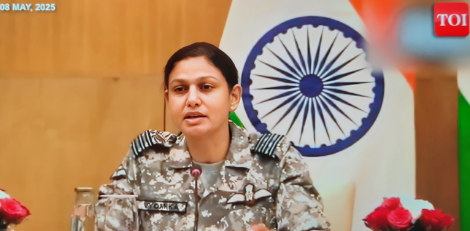
India Condemns Pakistan Using civilian aircraft as shields
In a shocking revelation, India condemns Pakistan of keeping its airspace open despite launching drone and missile attacks, effectively using civilian aircrafts as shields. The accusation comes amid heightened military tensions following Pakistan’s failed infiltration attempts using 400 drones.
Pakistan’s Airspace Tactics Raise Global Concerns as India Condemns Pakistan
During a special briefing on Operation Sindoor, Wing Commander Vyomika Singh of the Indian Air Force (IAF) stated that Pakistan deliberately kept its civil airspace open, knowing that India would retaliate against its May 7-8 attacks. This reckless move endangered international flights, including those flying near the India-Pakistan border.
India presented flight radar data, showing that while Indian airspace was cleared of civilian traffic, Pakistan continued to allow commercial flights between Karachi and Lahore. The Indian government condemned this action, calling it a serious breach of international aviation safety norms.
Pakistan’s Drone Offensive and India’s Swift Response
On the night of May 7-8, 2025, Pakistan launched a coordinated drone and missile attack, targeting Indian military bases and civilian areas. India responded swiftly, deploying Barak-8 and S-400 Triumph missile defense systems, along with Akash SAMs and indigenous anti-drone technologies, to neutralize the threats.
Reports indicate that Pakistan deployed between 300 and 400 drones, identified as Turkish-made Asisguard Songar models, in an attempt to infiltrate 36 locations across Jammu, Punjab, and Rajasthan. India successfully repelled each attack, ensuring minimal damage to its infrastructure.
Pakistan Temporarily Closes Airspace After India’s Accusations
Pakistan issued a Notice to Airmen (NOTAM) and briefly closed its airspace in response to India’s charges. The move came after India’s retaliatory strikes targeted Pakistani military installations, forcing Islamabad to reconsider its airspace policies.
Geopolitical Ramifications and Global Reactions
India’s accusations have sparked global concerns, with aviation experts warning that Pakistan’s actions could endanger international flights. The United Nations and International Civil Aviation Organization (ICAO) are expected to review Pakistan’s airspace policies, ensuring compliance with global aviation safety standards.
Meanwhile, Prime Minister Narendra Modi convened a high-level security review meeting, discussing India’s next steps in response to Pakistan’s provocative actions. Defense analysts predict further military engagements if Pakistan continues its aggressive airspace tactics.
What’s Next?
With tensions at an all-time high, India remains committed to safeguarding its sovereignty and ensuring civilian safety. As the situation unfolds, global leaders are closely monitoring developments, urging diplomatic resolutions to prevent further escalation.
Stay informed with the latest news and updates – only on Rapido Updates.
1 thought on “India Condemns Pakistan Using civilian aircraft as shields.”